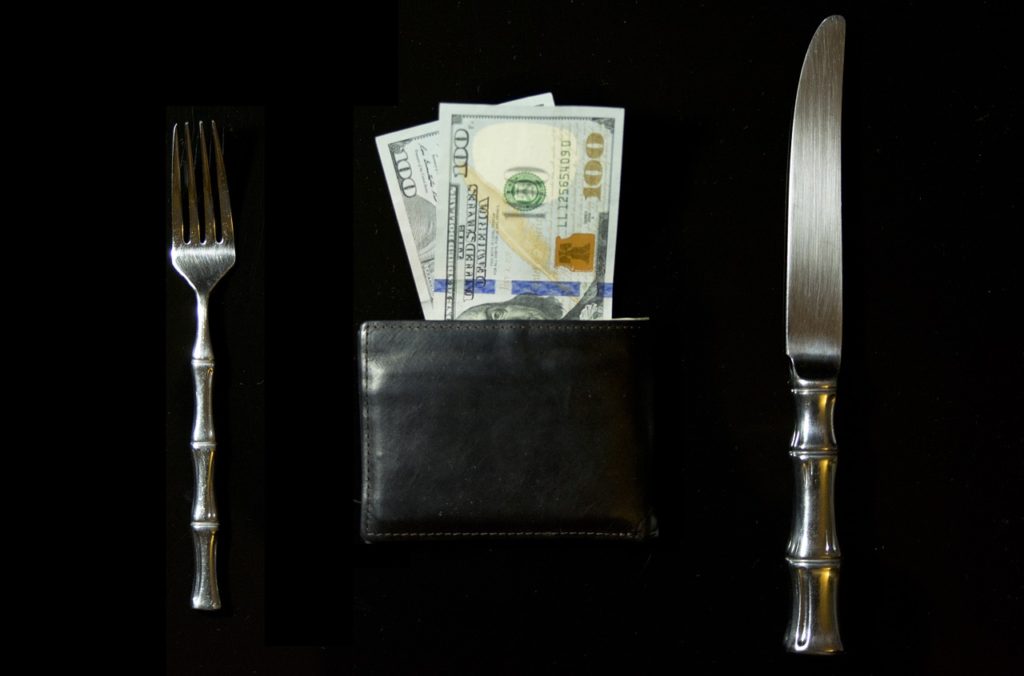
Are you great at budgeting, but over eat? Maybe you great at eating healthy, but carrying around loads of debt. It’s time to make a switch, stop self-sabotaging and bring your success in one area to take care of the other.
The Same Thought Process
Extra weight and credit card debt are symptoms of the same thought process. How do you feel when you look at your body in the mirror? Think of the extra fat as caloric debt.
How do you feel when you sit down to budget? Think of your debt as financial blubber. If one of those gives you a knot in your stomach, thinking your goals are unachievable, keep reading.
What Are Your Emotional Triggers?

You can’t know where to cut back excess calories if you don’t know what you’re eating. A food journal is a great way to go.
The first step to success is to ask yourself what’s getting in the way, and identifying the emotional triggers that have you overspending your daily calories on a chocolate eruption or running to the mall for a spending binge.
For some, it’s dealing with uncertainty, and for others it could be a question of not managing stress.
We over-eat and over-spend because we feel like we are not enough. You don’t have enough stuff. Enough energy. Sufficient time. Enough good things in our lives.
With enough consciousness around gratitude in our lives and a focus on what’s truly important, we can see that these thoughts are simply not true.
Energy is everywhere to be captured. You can learn to be more optimistic. You can easily find time when you focus on the most important things. Your life is full of good experiences, and you’ll have many more. You are resilient.
Start Where You Are in your Budget

No need to over-complicate things. You bank probably has simple tools online to track your expenses.
Once you have identified the triggers and start challenging your thoughts of “not enough,” it’s time to see where all the dollars (or calories) are going. Don’t believe society’s hype.
A detailed budget of your monthly expenditures will help you recognize areas you can cut back in the same way a food journal will help you see the habits you can change.
In your food journal, write down not only what you eat each day, but how you feel before and after you eat it. (you may even discover a food allergy that makes you tired or gives you a headache!)
When you see those things in your budget that you bought and didn’t really need, what was your state of mind at that time? How were you feeling?
Make the Changes
The next step is deciding what stays and what goes in your behavior. When you want to overeat or think you need some shopping therapy, challenge your thoughts of “not enough” and find a healthy, inexpensive way to soothe yourself.
Talk with a friend. Go for a walk or run. Buy a tea you’ve never heard of. Write in your gratitude journal.

Instead of only focusing on making more money, focus on defense: spending less!
It’s a simple question of offense and defense. Offense is making more money each month or doing more exercise to increase your caloric budget, and defense is the money you keep in your pocket or what you don’t eat.
The same way you serve yourself dinner and put everything away in the fridge so you don’t go for second helpings, you can do all of your savings and investment the moment you are paid, so you don’t get that itch to spend what’s left in your account.
Our self-talk is kind of dumb sometimes—it can be temporarily distracted and then take awhile to come back, so if you take a healthy action rather than an unhealthy one, you might just end up replacing your old habit.
Make It Stick
The final step is accountability. Write down your goals. Tell your friends and loved ones, and celebrate your victories. If you get off-track, think like a GPS: in other words, just get back on the highway and don’t berate yourself and think the destination is unachievable.
Has your GPS ever told you that you’re stupid and you’ll never get there? Mine hasn’t. Don’t get caught up on where you should be–where you should be is where you are right now, and look how far you’ve come!
What are your financial goals? Are you taking steps today to get there? What are your fitness goals? What’s getting in the way?

Paul Strobl, MBA, CPC
Owner of Confide Coaching, LLC
Paul is a Master Life Coach for GenX and GenY executives and business owners. Originally from Houston, Texas, he has been location independent for most of his adult life. He currently resides in the Rhodope Mountains of Bulgaria near the Greek border with his brilliant wife, 14-year-old stepson (officially adopted in 2021!) and a Posavac Hound rescue.

